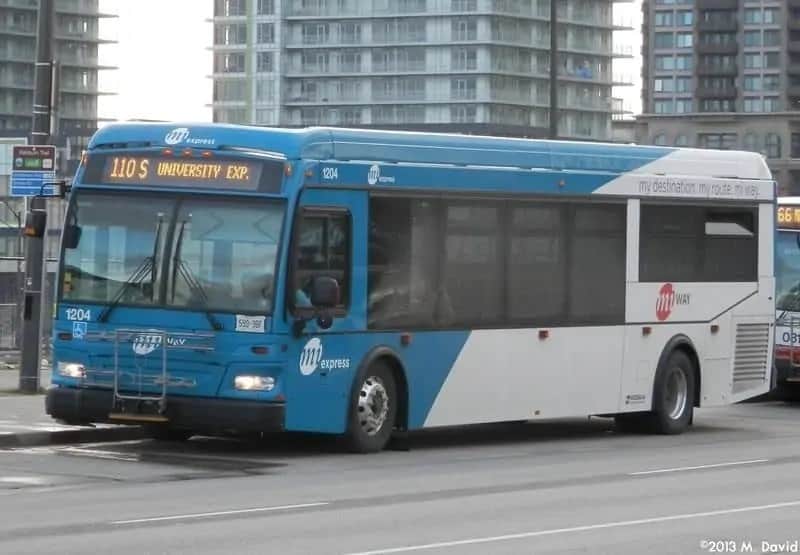59 million riders boarded MiWay transit buses in Mississauga in 2023
Published September 23, 2024 at 1:56 pm

The number of passengers now riding MiWay buses in Mississauga has significantly surpassed ridership figures from prior to the COVID-19 pandemic in what city transit officials describe as a period of “remarkable growth” in demand for service.
Some 59 million customer bus boardings were counted in 2023, officials at MiWay, the city’s public transit provider, said in their annual Report to the Community released last week. That’s an increase of about 10 per cent, or more, over 2019 numbers (the pandemic struck in early 2020).
By comparison, the city said Monday in an email to INsauga.com, there were nearly 48 million boardings in 2022 and just under 31 million in 2021, when pandemic restrictions were still in place.
And officials said the dramatic growth continues this year.
“MiWay experienced remarkable growth in demand for transit service in 2023,” officials said in their update. “With 59 million annual customer boardings by individuals headed to work, school, medical appointments, sports events, entertainment and more, this rapid growth presented a number of challenges for MiWay to overcome.”
MiWay has responded to the increased demand with service enhancements on various fronts, including the hiring in May of 44 new bus drivers and 11 mechanics as part of a plan to put more buses on Burnhamthorpe Road, Dundas Street and other major roads across Mississauga.
City of Mississauga transit officials said they’re “investing in service, engaging with the community and adapting to changing travel patterns to help improve the customer experience and transform Mississauga to shape the future of our community, and enable the economic, social and environmental aims of our citizens and businesses.”

(Photos: MiWay X)
In total, MiWay officials said earlier, service on transit routes will be boosted by about 57,000 service hours and some 2,400 hours of additional maintenance and repair service to get buses back on the street faster.
With MiWay ridership back to and exceeding pre-pandemic numbers as of late 2023, transit officials said the latest service upgrades are needed in order to meet the growing demand.
And that demand has continued to rapidly grow so far this year as well, they added, noting there will soon be “more buses on the road more often and on the routes that need them the most” to ensure dependable, on-time service for riders.
“We’ve seen a significant increase in demand for transit services in our city and we’re increasing service to match,” Mississauga Deputy Mayor and Ward 8 Coun. Matt Mahoney said earlier this year. “The addition of new drivers and maintenance workers will allow us to build the kind of capacity that our residents need and expect from MiWay. Through the Dedicated Gas Tax Fund for Public Transportation program, these improvements will do exactly what they’re designed to do and contribute greatly to improved quality of life for our residents.”
The Dedicated Gas Tax Fund provides municipalities with the means to support and improve transportation services.
Several routes to see significant service increase
The funding allocated to Mississauga will increase service and maintenance through the addition of the 44 new transit drivers and 11 new maintenance staff, the city said.
Those additions will help increase service with a focus on the following routes:
- Burnhamthorpe Express — Route 126
- University of Toronto Mississauga — routes 44 and 110
- Kipling Bus Terminal — Route 11 (Westwood Mall)
MiWay officials said service will also be improved by redirecting the transit fleet’s larger 60-foot buses (with greater passenger capacity) to busier corridors such as Mavis Road (Route 61) and McLaughlin Road (Route 66).
“The ability for us to increase the service on some of the busiest routes in Mississauga means residents can get to their destinations quicker and with even more dependability,” said Eve Wiggins, the city’s director of transit. “We’ve listened to our riders and are taking action to meet their needs.”
In addition, Mississauga is poised to become the first municipality in Ontario to put hydrogen fuel cell electric buses into service as part of its public transit fleet, which currently numbers about 500 vehicles covering 65 routes.
City council is expected to put a final stamp of approval this Wednesday on a plan that will see the City of Mississauga buy 10 40-foot hydrogen fuel cell electric buses at a cost of $20 million.
MiWay would welcome the new buses sometime in early 2026 if council gives the green light to the pilot program.
INsauga's Editorial Standards and Policies


